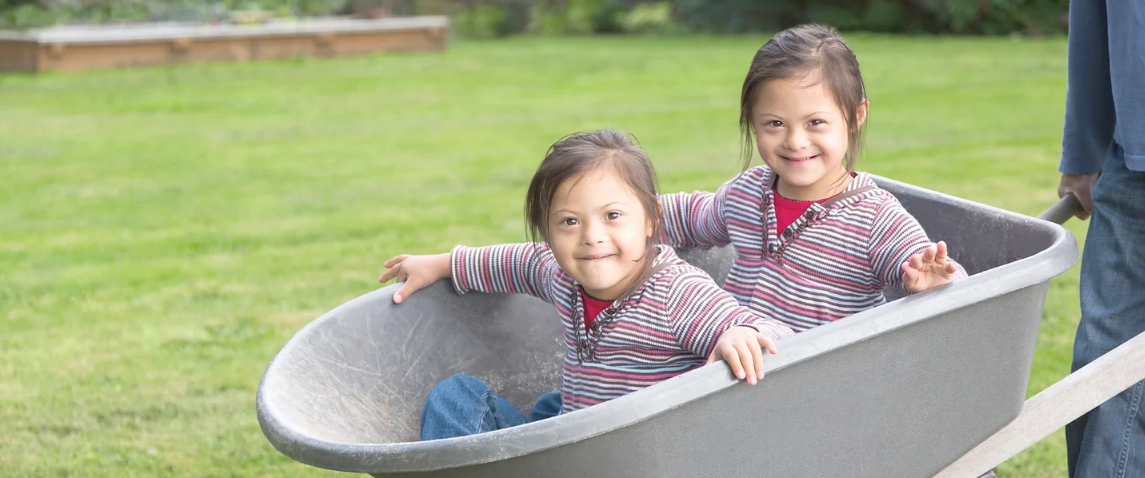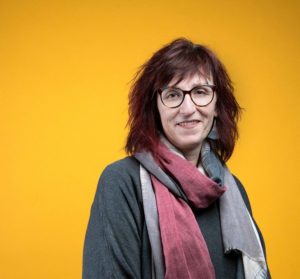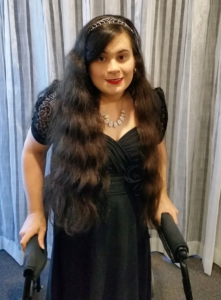
Finding solutions to help people with disability who are victims of domestic and family violence requires difficult inquiry – and Flinders University is leading the way by ensuring that people with disability are co-designing and helping to deliver essential research projects.
Jala Burton, a community researcher who lives with cerebral palsy and is studying social work and a Bachelor in Community Services at Flinders University, has partnered with Flinders Caring Futures Institute disability researcher Professor Sally Robinson to co-design research around the sensitive topic of domestic and family violence (DFV) affecting people with disability, especially to record the experiences and recommendations of children and young people.
Professor Robinson says collaborating directly with people with disability on issues that directly affect others with disabilities generates the best outcomes – with Jala providing added benefits through her expertise and skills in social work. “Jala brought insights to this project that could only be provided from an insider’s perspective of how disability services operate,” says Professor Robinson. “She brought such a wonderful spirit of inquiry into the project, and she also continually reminded us who we are here for – and to privilege the young people’s perspectives on these issues.”

The research report – “Connecting the dots: Understanding the domestic and family violence experiences of children and young people with disability within and across sectors” – was completed and published as part of the ANROWS research reports series in September 2022.
“What I really value about this work is the fact it has been co-designed rather than being a consultancy,” explains Jala. “Nobody can know everything or do it all by themselves, so co-design provides a way for people of diverse expertise to come together and to care about social issues in need of change.”

The important distinction between co-designing and consulting is that Jala worked in partnership with Professor Robinson and the cross-university research team through every step of the research project – from establishing the criteria and conducting practical research, to analysis of the research findings and writing the final report.
Phase 1 of the research found that children with disability are twice as likely to have a mother hospitalised due to a DFV assault (8% compared to 4%) and that children with disability made up approximately 30% of children who had experienced DFV. It found that children and young people with disability often know more about violence and safety than adults assume. “Young people are at the centre of their own experiences and their own lives, and that has to be remembered when addressing disability services,” says Jala.
Research participants also identified what effective service delivery could look like, naming attributes such as practitioner consistency, flexible use of supports and disability-informed practice. Unfortunately, those interviewed also said these characteristics were often not replicated in the services they were receiving.
“There are so many layers to service access, and it shouldn’t come down to luck whether a child or young person in need can obtain them,” says Professor Robinson. “We identified that a lot of young people’s experiences were misunderstood, and that their own disability-related needs get lost in their families’ crisis situation. It results in people missing out on services they are entitled to.”
The plain-English research summary provides valuable guidance for DFV and disability service providers, and Professor Robinson says Jala’s input into the summary has brought great clarity and sharp focus to the document. “It uses simple language and imagery and is designed to support all organisations working to deliver services to children and young people with disability where domestic and family violence may be present,” she says.
The research team is now working with some of the service providers in both domestic and family violence and disability services, to develop a practice framework. “It will make the research results particularly useful within each sector, to make their work more trauma-informed and more youth-informed,” says Professor Robinson.
The success of this project and the experience gained through how it unfolded can now stand as a model for future co-design research programs that involve people with disability, for them to take an intrinsic role in every aspect of the research.
“There are always limitations to overcome, and I think a pretty low bar has been set in what is expected of co-designed research projects, but through this project we’re learned more about how to best use people’s skills and talents,” says Professor Robinson, “especially in the analysis and writing of reports, where the input of people with lived experience really strengthen the outcomes and outputs.”
“These topics can be very challenging for people to talk about, but this collaboration was so important, because all the stakeholders have a shared purpose,” says Jala. “We all want life to be better and to make improvements, and this only happens if everyone works together.”

